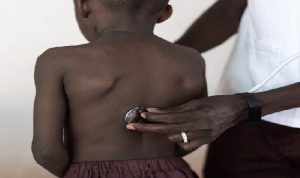23-10-2024
HARARE/ KAMPALA: Millions of teenagers in Africa are suffering from asthma with no formal diagnosis as the continent undergoes rapid urbanization, researchers have found.
The study, published in the Lancet Child and Adolescent Health, involved 27,000 pupils from urban areas in Malawi, South Africa, Zimbabwe, Uganda, Ghana and Nigeria. It found more than 3,000 reported asthma symptoms, but only about 600 had a formal diagnosis.
 Many of the children reported missing school or having their sleep disrupted by wheezing.
Many of the children reported missing school or having their sleep disrupted by wheezing.
“If our data are generalizable, there are millions of adolescents with undiagnosed asthma symptoms in sub-Saharan Africa,” said Dr Gioia Mosler of Queen Mary University of London, the study’s research manager.
The team that led the study, whose research on the impact of pollution on lung health was instrumental in introducing the ultra-low-emission zone (Ulez) in London, said there was an urgent need for medicines and diagnostic tests in the region.
Rates of asthma have increased in sub-Saharan Africa over the past few decades, a trend attributed to rapid urbanization which exposes children to more risk factors such as air pollution. The climate crisis was also likely to have an impact, experts said.
The Achieving Control of Asthma in Children and Adolescents in Africa (Acacia) study recruited pupils aged between 12 and 14. Screening revealed that while 12% reported asthma symptoms, only 20% of that group had received a formal diagnosis of asthma.
Lung function tests suggested nearly half of undiagnosed participants with severe symptoms were “very likely” to have asthma.
Even among those who had received a formal diagnosis, about a third were not using any medicine to control their condition, according to the study.
Dr Rebecca Nantanda of Makerere University in Kampala, who led the research in Uganda, said: “Undiagnosed and poorly controlled asthma greatly impacts on the physical and psychosocial wellbeing of the affected children and their caregivers. The high burden of severe undiagnosed asthma revealed by the Acacia study requires urgent attention, including access to medicines and diagnostics.”
 Prof Jonathan Grigg of Queen Mary University of London, said asthma was made worse by exposure to small particles of pollutants, with the impact of the climate crisis yet to become clear. “In some areas in sub-Saharan Africa, climate change is likely to result in increased exposure of these vulnerable children to dust and natural fires. “On the other hand, climate change mitigation will, hopefully, reduce exposure to fossil fuel-derived particles in this region.
Prof Jonathan Grigg of Queen Mary University of London, said asthma was made worse by exposure to small particles of pollutants, with the impact of the climate crisis yet to become clear. “In some areas in sub-Saharan Africa, climate change is likely to result in increased exposure of these vulnerable children to dust and natural fires. “On the other hand, climate change mitigation will, hopefully, reduce exposure to fossil fuel-derived particles in this region.
“The pharmaceutical industry has been hesitant to support asthma research and initiatives. For example, companies may feel that they cannot support research in countries where they do not intend to market their asthma product,” he said.
“Innovations such as handheld wheeze detectors and asthma clinics delivered at schools also have the potential to substantially reduce the burden of asthma.”
Four million children develop asthma every year as a result of air pollution from cars and trucks, equivalent to 11,000 new cases a day, a landmark study has found.
Most of the new cases occur in places where pollution levels are already below the World Health Organization limit, suggesting toxic air is even more harmful than thought.
The damage to children’s health is not limited to China and India, where pollution levels are particularly high. In UK and US cities, the researchers blame traffic pollution for a quarter of all new childhood asthma cases. (Int’l News Desk)
 Pressmediaofindia
Pressmediaofindia




